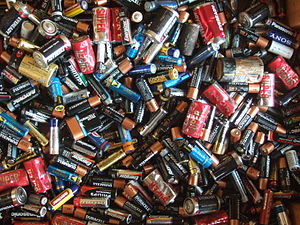By now, most people are pretty familiar with how to recycle plastic, paper, and glass, but what about electronics and batteries? This week we'll focus on these newer and trickier categories of recyclables, and how you can keep these items and their potentially dangerous chemical ingredients out of our landfills.
| Batteries. (Photo credit: Wikipedia) |
In addition to battery acid, the metals of batteries can be dangerous when left to leak into the soil. Heavy metals can get into your soil, water and even into your food.
Instead of throwing out your batteries, you can simply recycle them. This keeps those dangerous poisons out of the environment and reduces the amount of trash in landfills. In fact, many places now consider batteries a form of hazardous waste and prohibit them being thrown away; however, even in these areas, very few batteries are being recycled.
If you get a large battery replaced, like in your car or boat, make sure you know what’s happening to your old battery. While it may cost you a small fee, you should be able to ensure your battery is properly recycled after it’s taken out of your vehicle. There are many companies that now offer services to help companies recycle batteries. You can find a place that already recycles, or encourage your mechanic to do so.
Other batteries might take a little more effort to recycle. You will likely need to take them to a hazardous waste recycling station. While you may not have a clue of where to find them, a quick online search will help you find local drop offs where you can take your batteries. If it’s far away or a bit of a hassle to get to, you can have a place in your house to store dead batteries until you have enough to take over. Just remember not to let them sit too long because they can begin to deteriorate and become dangerous.
You may also find that local businesses will recycle batteries for you. There are companies that will set up recycling for businesses for a low price, so they may offer to recycle for you if you can get your batteries into the store. If you look around, you may find a convenient location so you don’t have to go all the way to a recycling center.
| Rechargeable batteries. (Photo credit: Wikipedia) |
Once you’ve safely recycled your batteries, keep going. Everything in your home from electronics to fluorescent light bulbs can be recycled to provide us with a safer, cleaner world. So start researching and get recycling!
For how to recycle electronics, be sure to check back Thursday.



No comments:
Post a Comment